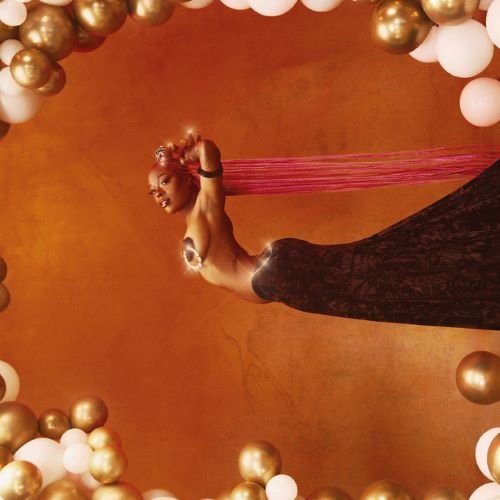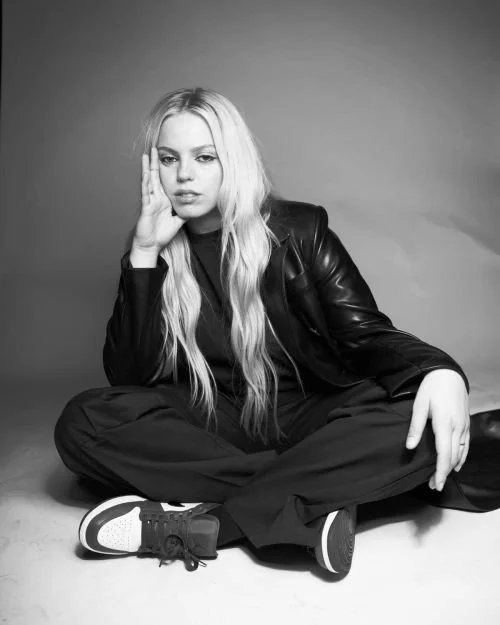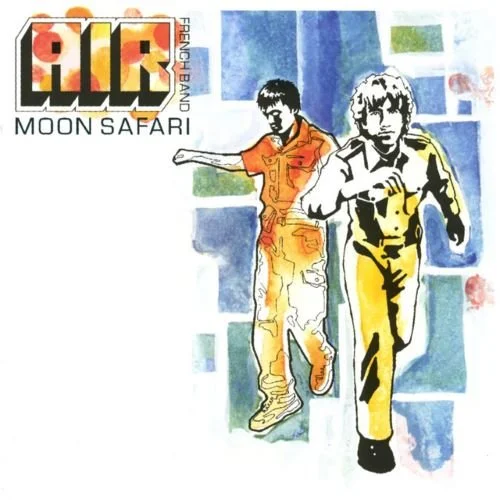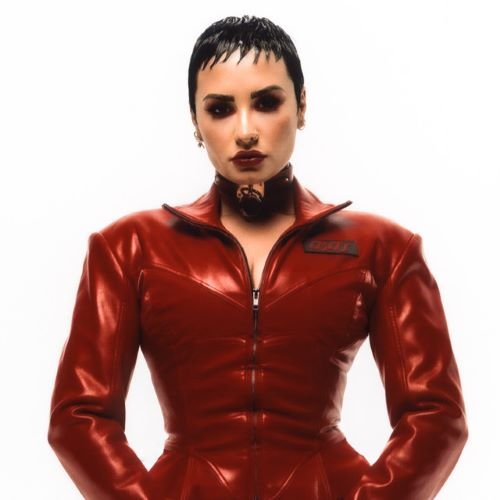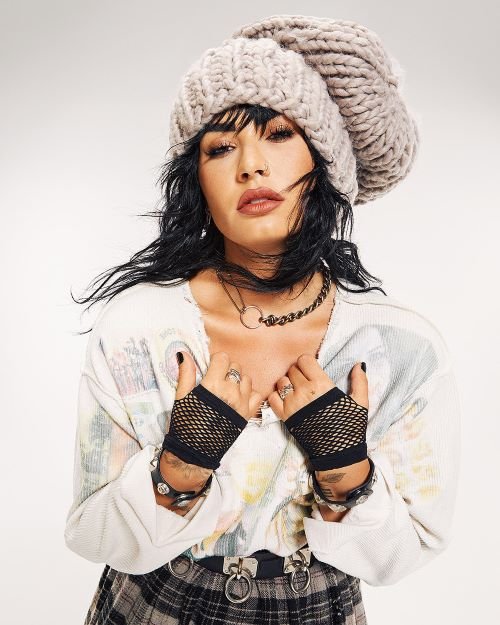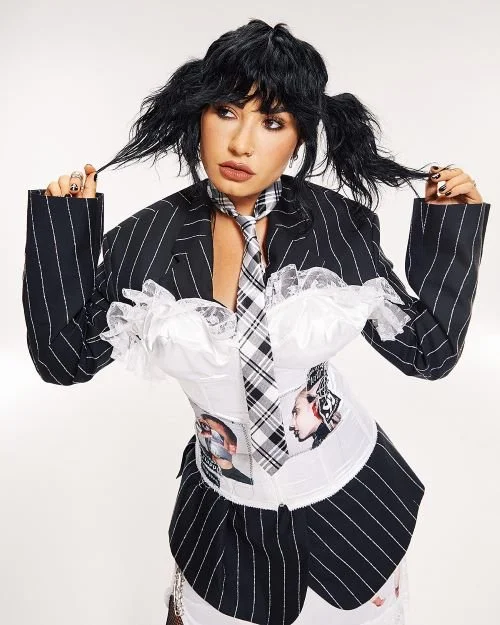FEATURE:
Revisiting…
Sudan Archives - Natural Brown Prom Queen
_________
THE amazing second studio album…
PHOTO CREDIT: Edwig Henson
from Sudan Archives is one I want to highlight for Revisiting…. Brittney Parks’ alter ego released her debut, Athena, in 2019. A brilliant debut and one of the best albums of that year, Sudan Archives’ second album, Natural Brown Prom Queen, I think is even finer! It did get great reviews last year, but I think it should have been placed higher in many end-of-year lists. Definitely a top-five album of 2022, I want to put it back in the Spotlight. Released in September, this is an album that everyone needs to discover and embrace! I will come to a couple of reviews for the staggering Natural Brown Prom Queen. There are a couple of interviews around the release of Natural Brown Prom Queen that I want to bring in. Women in Pop back in September. It is clear that, even though her debut was amazing and ambitious, she has stepped up a few gears on her second studio album:
“Today she releases her second album Natural Brown Prom Queen. It is arguably her most ambitious work to date, eighteen tracks long and taking everything back to the very foundation of who she is – a celebration of home and of family and relationships, all through the eyes of ‘Britts’, the character she inhabits for the album.
Again, Parks creates a wide range of sounds on the album. There is a R&B foundation to much of the album, but there are also plenty of intriguing sonic twists and turns. ‘Home Maker’ is a funky, disco infused track that conjures up the 1970s music scene, while ‘Selfish Soul’ is a booming track that brings together rap, pop, R&B and violin in one euphoric track. ‘Homesick (Gorgeous & Arrogant)’ is an intimate ballad, while latest single ‘OMG BRITT’ is a sultry, sensual hip-hop track. ‘NBPQ (Topless)’ barrels along with a pulsing beat that morphs into a electronic experimental track with Parks switching between rapid fire rapping and beautifully sweet vocals before ending on classical violin. The raw lyrics discuss Parks’ life long struggle with racism: “Sometimes I think that if I was light-skinned / Then I would get into all the parties,” she sings.
Natural Brown Prom Queen is personal, candid and raw, confronting difficult issues including race, self-worth and gender inequality, but also the joy and love embedded in family, friends and where we come from. It is quite possibly Parks’ greatest work to date and an album to savour from beginning to end as a complete body of work. We recently caught up with Sudan Archives to chat more about the creation of the album.
Hi Brittany, it is an absolute joy to grab some time with you today. How are things in your very talented musical world?
They are pretty good. I’ve just been performing the new songs at all of these festivals and that's been fun and new. It's just nice doing some new stuff. I feel like I was playing my older stuff for like years! It makes touring way more fun being like, ‘oh, what new song am I gonna play today?’
Absolutely. I'm imagining the crowd is completely eating it up. How has the reaction been from the crowd? They're dancing, which is what I want!
Beautiful. Your new album Natural Brown Prom Queen is such an incredible album. You make joyful music but at the same time you talk about such incredibly important issues. What was your motive going in to Natural Brown Prom Queen?
I don't really know what the motive was, but I made everything in my basement, which I've never done before. I usually would have to record in my bedroom or in other people's studios, but because COVID happened, I made the studio. I was able to finally come down here and figure out how to make it liveable. I feel like that was like the biggest motive of the album, to make it homemade and to make everything in-house.
You're such a multi talented taskmaster when it comes to creating music anyway. Did you feel that making it in house it increased your confidence as an artist, to be able to go ‘do you know what? I can do all of this.’
I always knew I could do all of it, but for some reason I feel like my writing levelled up. Probably because since my first EP I always have been feeling very rushed to put out more material. But COVID slowed everything down and made me realise that I don't really need as many hands on the project, but I just need time.
It's such a different album to Athena. How did you balance your desire to still be experimental alongside what I imagine is the pressure to create something just as good?
Well, I kept this area [in the basement] as the experimental zone and kept an open mind. I let other people collaborate remotely, so it didn't interfere with what I was doing down here. That's the biggest difference, because before I was taking what I was doing here, putting it on my computer, and taking it to other studios, and then having to like build it with them in person. And I don't really think I work best that way. It worked out better just to keep everything here, stay here and never leave and always be in the experimental zone. And then just checking my email for people's contributions and being like, ‘I like that, I don't like that’, or ‘Oh, I like both of those things, let's make that the verse and make that the hook’. I was doing a lot of things I would have never even done before if I was in the studio with each person separately. Instead of working with one person on one song, three people would do something to one song. That's kind of how I feel like I've beat what I did previously, because the more people you have, that are talented, working on one thing, the better”.
I am going to come to an NME from November. It was a point when Sudan Archives was touring Europe. NME saluted an artist, violinist and Pop songwriter who had released one of the defining albums of that year. A truly inspiring artist, there is nobody in music like the amazing Sudan Archives:
“She set up a home studio in the house she shares with her partner, All City Jimmy aka James McCall. It felt like a long overdue objective she finally got to accomplish which, in turn, allowed her to focus primarily on her music. “I spent more time in the studio than at home,” she says. Situated in the basement of her house, it has a separate entrance, allowing Parks to build out a studio full of plants.
“I always knew I wanted a studio in my house, but it worked out perfectly where I live now,” she explains. “It’s a cute little small space where I have all seven different instruments hanging up on the walls. It’s like my little cave.”
Bunkering down in her studio allowed Sudan Archives to create an album that, for her, was a reflection of her abilities. “As I began the creative process, I knew I didn’t want to work with people I didn’t know, like strangers,” she says. “I would rather work with people I have relationships with, But at the same time, if someone were to come along, who has a great idea, and they want to put it on the album, I’m not going to say no. At the end of the day, I want the songs to be the best they can be.”
PHOTO CREDIT: Ally Green
With an original title of ‘Homesick’, the album ended up being a mirror of Parks’ upbringing with her use of the violin throughout a natural incorporation of how she demystifies the traditional way of using the instrument.
“[Cat] was saying how on this album I’ve learned how to incorporate my violin in different ways,” Parks explains. “I didn’t even realise that when I started making the album, as I’m not even aware of what I’m doing. I’m just going with the feeling or what I’m feeling. I started off with looping and layering instruments, vocals and melodies until there was a song created.”
The violin plays an influential part in what is an indisputably effortless pop record. It’s confident and steadfast in its authenticity. With lines like, “Sometimes I think that if I was light-skinned / Then I would get into all the parties / Win all the Grammys, make the boys happy / Fuck lookin’ sassy, they think I’m sexy,” she peppers the album with uncompromising lyrics all seamlessly underpinned by infectious melodies.
PHOTO CREDIT: Ally Green
“Melodies have always come really naturally to me,” she says. “Even growing up, when I listened to the radio, I would always be humming along, but to a higher octave. I think I’ve had to learn how to hone in more on my production skills and growing to incorporate the violin.”
With the release of ‘Natural Brown Prom Queen’, Sudan Archives has certified itself in contemporary culture. Her talent isn’t just for the underground to celebrate, but for everyone to witness what is a generational talent coming into full bloom. The release of the album sees all the coiled energy of her entire life exalted onto a project that is the perfect marriage between vulnerability and honesty whilst being overwhelmingly infectious.
Though she may miss Goldie the python, her home studio, and the comforts of being in Los Angeles, Brittney Parks now gets to play the record to crowds across Europe who have been awaiting her presence for years, and it feels natural. “This feels a lot different than when I was just doing a couple of songs. I’m not used to playing for over an hour on stage, but I’m so grateful I get to do that”.
I am going to come to a couple of glowing reviews for the mighty Natural Brown Prom Queen. It is an album that Pitchfork named their second-favourite of 2022. The New York Times placed it at four. I think that it passed some by, and some reviews were a little underwhelming. Natural Brown Prom Queen deserves five-star reviews across the board. This is what CLASH noted in their review:
“Los Angeles-based singer, songwriter, producer and violinist Sudan Archives, real name Brittany Denise Parks, has returned with her long-awaited sophomore effort, ‘Natural Brown Prom Queen’. This sophomore album has come nearly three years after Sudan Archives’ critically acclaimed debut, 2019’s ‘Athena’, with little output in-between aside from a pair of remixes in 2020.
‘Natural Brown Prom Queen’ is a shapeshifting sonic endeavour through flashes of pop, electronica, R&B and hip-hop, but still feels a facilely coalesce and coherent experience. A prime example of Sudan Archives’ multi-genre skills is opener ‘Home Maker’ which is introduced with a drawn out, ambient-tinted intro, with foundations laid by a droning synth. Instruments drop in and out, creating an unpredictable atmosphere only glued together by vintage cinematic instrumental moments. Track two, ‘NBPQ (Topless)’ works in a similar format; frantic hand claps and wobbly riffage lead into a head-on flow from Parks’.
‘Yellow Brick Road’, the penultimate track on the record, dives into the pop element with crystal clarity. But even here, the listener is treated to a delightful instrumental passage, complete with natural textures, ambient swells and jangling bells – as well as the trumpet leitmotif teased on the opening track. ‘ChevyS10’ sits at the halfway point of the record track-wise, and is a six-minute electronica epic, culminating in a club ready house-meets-afrobeat breakdown. Across the record Sudan Archives’ vocal range is prevalent, whether it be softly crooning or spitting raps. ‘Milk Me’ is a moment on the album laced with heavenly vocal harmonies, layered over a rich backbone over percussive breaks and glittery melodies. The entire project shifts and morphs so much it is never boring, an incredible achievement considering the hefty eighteen-tracks. Even the short interludes throughout are interesting, and remain on the experimental wavelength of the tracks they are sandwiched between.
While ‘Athena’ focused in on Parks’ ability as a violinist, and rightfully so, this sophomore LP clearly wants to be a distinct step forward from the debut. ‘Natural Brown Prom Queen’ opens up dozens of auditory avenues, with glitch leaning cuts like ‘Copycat (Broken Notions)’ exemplifying that perfectly. Sudan Archives is proving that she is an artist who knows no bounds, and projects like this one are what is going to propel her further into acclaim and stardom.
8/10”.
The Line of Best Fit had their say about an album that seems to reveal new things every time I listen to it. There is no doubt Sudan Archives is among the finest artists in the world. This is more than evident throughout Natural Brown Prom Queen. If you have not heard the album, then please spend some time with it:
“Opener “Home Maker,” for example, shows Parks transitioning from an avant/ambient jazz intro (reverb-dabbed horns and sharp snare beats) to a funk-inflected R&B groove. Facilitating radical pivots and segues unprecedented in earlier work, Parks offers a supple and well-nuanced vocal, conjuring a moody Beyoncé.
“I’m not average,” Parks insists on the title song. Bolstered by bouncy synths and manic beats, along with a classically toned bridge that would get a grin from Brian Wilson, Parks shifts between self-glorification and hurling shade at those who get conned by player types. “Copycat,” meanwhile, points to Parks’ affinity for the hip-hop playbook, her smooth sprechstimme unfolding amidst a welter of synthy dashes and spry beats.
The album’s most memorable chorus unfurls in “Freakalizer,” Parks’ vocal fusing the chic house-party vibe of FKA Twigs’ Caprisongs and the more mercurial intonations of Rihanna circa Anti. “ChevyS10” is a percussive foray that similarly puts Parks’ vocal skills on center stage, the singer providing dynamic and interwoven lead, back-up, and harmony parts.
“Homesick (“Gorgeous & Arrogant)” features Parks as she navigates a mix of loungey horns and noirish synths. As the piece progresses, however, it veers toward a darkwave gestalt, echoey beats merging with sonorous bass notes. In this way, Parks again demonstrates her ability to maneuver various stylistic shifts.
Over Natural Brown Prom Queen’s 53 minutes and 18 tracks, the Cincinnati-born Parks displays her compositional skills, penchant for winning melodies, and versatility as a performer. Most strikingly, the set documents Parks as she integrates myriad approaches, balancing discipline and the hedonistic impulse”.
One of the best albums of last year, I wanted to revisit Natural Brown Prom Queen. Maybe Sudan Archives is an artist some do not know about, so I do hope those unaware or new listen to her new album. It is absolutely stunning. After a successful 2022 for Sudan Archives, it is going to be thrilling to see…
WHAT this year holds.
All of which helps Jones in her mission to be intimate and direct with listeners. Her confessional style began turning ears with 2018 single “Just My Luck,” a clapback against the entertainment industry: “Does my confidence offend you?” she wonders. “Cookie-cutter enough for you? Is my melanin offensive?” The video has resonated, amassing over 3 million views on YouTube. And these days, newer songs like “Love Is War” brim with vulnerability and intensity as she sings about the challenges of a fractured relationship: “I know you’ve got scars, I’ve got ‘em too.”
While Jones released music in her younger years, she’s now stepping into the rich R&B career she deserves, signing with High Standardz / Def Jam and hitting the studio with Grammy-stacking heavy-hitters like Bryan-Michael Cox, Darkchild, Eric Hudson, Bongo, Camper, Lil Eddie Serrano, Full Circle, and Rockette—folks whose credits span the panoply of modern R&B, from Whitney to Mariah to Beyoncé to Summer. To put it bluntly: these are people who place their chips on winners.
Of course, for Jones, it’s not about success so much as connection. Ultimately, she wants to use her voice as an instrument for change on a broad scale, a tool for growth on a personal level, and as a method to bring her fans closer to her—and, in turn, inspire growth in them.
“I’ve learned that the more I open up to them, the more I discover that I’m heard and supported,” says Jones. “I want to bring transparency to my music so my music can be relatable. You can fit yourself into this song. My journey and your journey are the same. You get me; I get you”.
Maybe people know Coco Jones more for her acting and role as Hilary Banks in Bel-Air. As she told VIBE in April, she has this thriving music career. I think that this is her main passion. You can tell that her heart and soul is put into every musical moment. I think that she will join the legends that she looks up to very soon:
“Do you feel pressured to present yourself in any certain way? Is there any of that in your mind when you create?
Sometimes I do get apprehensive thinking that I’m not raunchy enough to keep up with what sells, but I always remind myself that talent started off selling at first and talent will continue to be what sells. If I have to give a gimmick, then the song is not good enough for me. If I have to put all these words in it to catch people’s attention, then my lyrics just aren’t hitting. For me, it’s more of a challenge to continue to captivate people without having to do anything for show.
Do you think that “Caliber” sets the appropriate tone for everything else that you have coming? What other themes or topics are going to be explored by you musically?
I think “Caliber” has a lot of the key ingredients that are going to make up my album. The vibe makes you want to dance and there will be some full choreography, some five, six, sevens, and some eights, okay! Towards the end of the song, I’m doing some more vocal acrobatics because I want people to know that I be singing! I can sing. And my album will, of course, give some even bigger singing moments as well. But really that balance to me of classy, sexy, grown, and authentic. I do feel like “Caliber” has all of those elements and that will be the theme of my album whenever it comes.
Who are some of the people who have inspired you musically?
Well, growing up I listened to a lot of powerhouse singers, Aretha [Franklin], CeCe Winans, Mariah [Carey], Jennifer Hudson, Whitney [Houston]. Of course, I learned those bigger notes and that passion from them. As I got older, PartyNextDoor, SZA, Summer Walker. I love Alex Isley. Masego is dope… I like the way their songs feel. I want to make my songs feel the way that I feel when I listen to them.
On that note, how do you want people to feel when they listen to “Caliber?”
I hope that they love the lyrics. I hope that they get some IG captions up out of it. And I hope they want to hit a five, six, seven, and eight, because, in the music video, it’s going to give that. And I’m going to need all the girls to make a little TikTok with a dance routine and also remember the choreo. When the concert comes, we can all hit it together. Let’s all sweat our laces out”.
In November, You Know I Got Soul spoke with Coco Jones about her new E.P., What I Didn't Tell You. One of the interesting observations is how Jones might have started out leaning more on Pop, but she always set out to make authentic R&B. I think this is evident when you listen to What I Didn’t Tell You:
“YouKnowIGotSoul: Obviously that was a different time from you, so take me back to a young Coco Jones and how she would be reacting to this recent success you’ve been experiencing.
Coco Jones: It would be similar in the fact that it just feels surreal that all of things that you worked for are materializing, but my prayers have kind of changed. Now it’s more like “Help me maintain this and stay grounded and grateful” instead of “Make this happen please!”. I think surreal would be the main emotion, but also I think 2015 me would be less surprised because so much has happened since that year that humbled me and grounded me that I feel like I’m just more shocked that things have turned around so much.
YouKnowIGotSoul: Talk about that journey for you. What was it like finding your sound and discovering yourself as an artist? Back in 2015, you had just left Disney and quickly transitioned into being an independent artist.
Coco Jones: It was hard. I think that because I was a child in the industry, I didn’t know my identity. When kids are in high school figuring it out and having all these real life experiences and going through things way beyond their years, I was on set working. My worth ethic was way beyond my years and business mindset, but personally I feel like I was a little delayed in figuring out my identity. I think that tying into me being an artist made it more difficult to try to categorize what I am because I didn’t know what I wanted to sing or write about because I’m still figuring out who I am. I was still living life, but I think there’s good and bad to that. The tenacity that I gained from being a child actor made it so that I was going to get to this place regardless. Sometimes I look back and I’m like “Wow, I can’t believe I stuck it out”. Some of these days were really scary, but I think because I learned so much about rejection through these auditions and keeping my faith until I got to a yes, it kind of helped me go through this process of finding my artist identity no matter how long it took.
YouKnowIGotSoul: We really loved that we could press play and get into this new EP. There were some songs that made me wish I was a girl! *Laughs* Talk about the title of the EP “What I Didn’t Tell You” and if there was a certain message you had about the whole project.
Coco Jones: Well thank you! Happy that you want to be in the community, you’re welcome to join. *Laughs* I think “What I Didn’t Tell You” is really just my real life stories as I was figuring out who I am. I think people a lot of people that recognize me from “Bel-Air” are completely surprised that I sing well and they just don’t know enough about me. These are stories that are off-screen that were part of my life and journey of figuring out myself. I was turning up, being crazy adventurous and being in my feelings. These are stories that are off camera that I wanted to share.
YouKnowIGotSoul: When we spoke previously, you talked about the type of music you wanted to make. You said that you still wanted to make Pop music but you really wanted to make authnetic R&B. When we listen to a song like “ICU”, it feels like something that you’ve been wanting to make your whole life.
Coco Jones: “ICU” is more of a record that chose me more than I chose it. Like you said, I did want the bops that I could think in my mind like “This could chart!” but that’s not me being authentically me. That’s me being strategic and a hustler. When I heard the music for “ICU”, I couldn’t skip the track and go to the next song that would do numbers. I had to follow the music that called me. That was one of the times where I was being the most authentically an artist because I didn’t care how popular the song was going to be. I just wanted to express myself and match that beauty the music presented to me.
YouKnowIGotSoul: You’re really a busy person on the acting side as well as your singing career. How do you balance all of that?
Coco Jones: It’s a hard thing to do because I have two employees. One is my show and one is my music. They don’t care about each other and they both want me there. It’s hard, I’m not going to lie to you. I’m getting what I prayed for and now it’s like “Oh crap!”. But for me, I know what I want at the end of the day, I knew when Hilary was all over the place, I didn’t want people to not have music to listen to. That means I have to be able to compartmentalize and be present when I’m on set and forget of those characters and lines. I need to be me, find me and make music that’s timeless and classic. I do that until I can’t anymore. That day, if I’ve been in the studio for 15 hours, I may not be able to in the studio for 8 hours, but for those 3-4 hours it’ll be like “Let’s do something meaningful”. If it’s not different or authentic, let’s stop and restart or I’ll see you guys tomorrow because I can’t not give my full self to this if I give my full self to my show. It’s about what’s important to me and figuring out ways to do what’s important to me to the best of my ability. There’s no balance to that though, it looks different every day”.
Before getting to a review for the fantastic E.P., What I Didn't Tell You, I want to get to a December interview from Edition. In the interview, Coco Jones mentions a music titan who she would love to collaborate with. Let’s hope that this comes to fruition this year, as it would be magnificent to hear the two of them on the same track:
“How did you land on the title for your What I Didn't Tell You EP?
So let me tell you! [laughs] I told the team I want to tell stories about things people don't know about me. So while I was trying to be all artsy, they stopped me in my tracks and said, "What about What I Didn't Tell You?" All I could do was say yes because they helped me bring the most authentic version of my intentions to life.
I noticed you're listed as a songwriter on a lot of your songs. How important is it for you to pen your music?
I think it depends on the artist because half of a hit song is who's selling that product. If I see a dishwashing sponge and a Spongebob sponge, I'm buying the Spongebob one because I like him. If I can, I like to have creative input on the songs because I want to be able to sell them to the best of my abilities. How can I sell it the best if I'm not actively involved in the creative process?
That goes back to what you said earlier about working with Babyface. The collaboration process is optimal.
Correct. Unless Beyoncé says, "Here's a song," because I'm not changing anything! I'm singing it exactly how she told me to sing it! [laughs]
That sort of answers my next question. Who do you want to collaborate with that you haven't?
Well, Beyoncé, I'm speaking this into existence because I want to be here for the long run, have power behind my name so I can do good in this world, and because I'm here for abundance in the high-caliber of quality that follows my name. I love Lucky Daye! I think he's so dope! Do a really hot and powerful girls' anthem with Alex Isley, Summer Walker, Chloe x Halle, SZA, Ella Mai and all the R&B girls! I want to do something with Calvin Harris because I love EDM, so if he wants me to sing on something, I'm singing on it. I don't want to be stuck in any genre because I'm into any and everything creative.
I'd be remiss if I didn't ask about Bel-Air. Knowing the difference between Courtney and Coco, how much of yourself goes into playing Hilary Banks and other characters you play?
Hilary is very much like me. She's very goal-oriented, brutally honest, charismatic, funny, and gives off boss energy. To be honest, I haven't played a character who is too far away from who I am.
Is that something you want to change?
Absolutely! It's a goal of mine to play a completely menacing character, be in an action-adventure or play a tomboy”.
After releasing, in my view, her best E.P. yet, things look very promising for Coco Jones. A magnificent R&B artist who is going to keep on making the absolutely finest music, I was very eager to spotlight her. I hope people check out what she is doing. Soul Bounce were among those to have their say about the stunning What I Didn’t Tell You:
“That chick. That girl. It girl. Princess of R&B. Those are just a few of the monikers fans have bestowed upon Coco Jones in recent months. The singer/actress has had a breakout year and made major waves from starring in Bel-Air (as the iconic character Hilary Banks) to working with Babyface (on their duet "Simple" from his Girls Night Out album). Perhaps her greatest achievement, though, is the release of her Def Jam Recordings debut with her EP What I Didn't Tell You.
The seven-song collection dives deep into a more personal side of Coco's life, giving us a peek behind the curtain of stardom as she details what happens after everyone leaves and the lights go out.
The EP opens with the sassy bop “Crazy For Me,” where Coco describes the lengths a man is willing to go to get and keep her attention. It sets up the lead single “Caliber,” in which Coco instructs romantic interests on how to shoot their shot with her. The enticing track unveiled a grown and sexy version of Jones fans hadn’t seen prior to its release.
Throughout the project, Jones brilliantly bridges R&B's generation gap with her sound, style and fresh takes on beloved classics. On “Double Back,” producer London On Da Track tactfully samples SWV’s “Rain,” including lead singer Coko's distinctive vocals in the background. The song is a standout moment on the EP, showcasing the strength of both Coco’s vocals and songwriting ability, conveying the rollercoaster of emotions that arise when attempting to rekindle an old flame.
We next get Jones at perhaps her most vulnerable on the EP's second single “ICU.” A stripped-down version of the leading lady appears as she reflects on the difficulties of growing apart from someone you deeply love but honestly aren't ready to move on from yet.
An allusive side of the singer-songwriter emerges over an upbeat track on “No Chaser.” The lyrics, production and vocals are deliciously crafted as Coco gives flirtatious femme fatale while flipping Ginuwine’s “Pony,” tucking in another Easter egg for listeners.
The next song, “Headlines,” is a warning call. Coco cautions her no-good man that she's on to his games and lies, and she's not the one, the two or the three to be played with.
Babyface repays the favor of Coco Jones blessing "Simple" by lending his genius pen to the song “Spend It,” which closes the EP and ends it with a sweet sentiment. Coco may not have a lot of time or money to spend, but she is willing to go the distance for what – or rather, who – she wants.
What I Didn’t Tell You confirms what we knew all along: Coco Jones is the ONE. Having already earned respect for her acting chops, this dazzling project puts her at the head of R&B's current class. One of the most talented artists of her generation, Coco Jones is the total package, making it impossible to want anything but to see her win”.
In addition to be a terrific actor, Coco Jones is a hugely exciting artist whose music is among the best I have heard for years. I love her new E.P., and many will wait with bated breath for an album. I hope that she gets to come to the U.K. at some point in the year, as there are many who would love to see her play live. If you have not heard Coco Jones’ music, then make sure that you…
DO not miss out.
__________
Follow Coco Jones
Official:
https://www.therealcocojones.com/
Instagram:
https://www.instagram.com/cocojones/
Twitter:
https://twitter.com/TheRealCocoJ
TikTok:
https://www.tiktok.com/@cocojones
Spotify:
https://open.spotify.com/artist/4DHLoiIqFYYFjH09WduvFd
YouTube:
https://www.youtube.com/c/cocojonessings/featured
Facebook:

